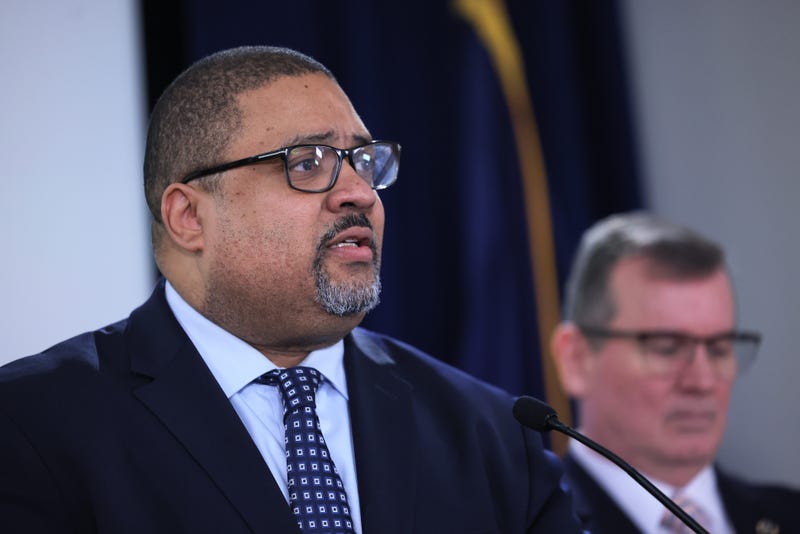
NEW YORK (BLOOMBERG) -- Manhattan is the testing ground for a new initiative to keep more people with low-level offenses out of court.
The pilot program is part of Manhattan District Attorney Alvin Bragg’s push to expand the city’s public safety infrastructure beyond the criminal justice system, even as some politicians are doubling down on traditional methods to combat crime.
The latest move is an expansion of Project Reset, which started in 2016 to offer people accused of petty crimes like shoplifting and fare evasion an opportunity to avoid the court process entirely. By completing a class, participants can avoid fines, jail time and having the charge on their record. While other reform efforts are focused on bail, jail and prison, this initiative catches people at an earlier step in their journey through the criminal justice system.
After eight years and 4,000 participants, researchers have identified pain points that Bragg’s office is looking to remedy: The RAND Corporation found that more than three-quarters of the people eligible for the program never participated, because the nonprofit that runs the initiative wasn’t able to reach them. Instead, they were going to court and pleading guilty or having their case dismissed with conditions, both of which create a criminal record.
Now, the program is trying something new to reach people where they are: When they appear for their first court date, eligible individuals are offered the opportunity to join the program rather than go through court.
The new initiative, dubbed Rapid Reset, is being tested at both the Midtown Community Justice Center and the Manhattan Criminal Courthouse, where a controlled chaos has taken hold on Tuesdays in the hallways of the downtown court, as a cast of nonprofit workers from the Center for Justice Innovation scramble to gauge interest in the diversion program.
Once a person has consented to the program, they are taken to participate in a workshop on overdose intervention, social resilience or restorative justice — programming intended to help people make better choices so they don’t end up back in court again. The district attorney’s office then declines prosecution and their charges are sealed. The whole process takes a few hours and is over with completion of the session.
Bragg says the program focuses on cases that are often eventually dismissed anyway — but only after a months-long court process that imposes costs on both the individual and the city.
“These cases are ones that generally have been dismissed and there have been no interventions. Here we’re providing an intervention when a person comes to court,” Bragg said.
Rapid Reset targets cases that involve people who were arrested and given desk appearance tickets, which are the most serious type of ticket, but do not rise to the level of needing to hold a person in jail pre-arraignment. A recent study, found that in 2022 roughly 60% of the 27,000 desk appearance tickets issued got a ruling at arraignment. More than half of those were either dismissals pending good behavior or outright dismissals and 41% were guilty pleas.
The RAND study of the original program also looked at two other considerations: How the program affected crime, and whether it saved the city money. It found that the program had no observable effects on the rates of re-arrest, meaning participants were no more or less likely to participate in future crimes. The study also found that the per-person cost is not yet lower than court. The DA’s office is hoping to change that by expanding participation.
New York City has been testing criminal justice models outside of bail, jail and other punitive options for crime-fighting. Last fall, Bragg’s office announced a program to connect recently arrested people who may be suffering from mental illness or substance use disorder with peers to help them navigate the social safety net. The city also set aside an additional $36 million for its supervised release program, an alternative to pretrial incarceration that pairs people accused of crimes with social workers who provide counseling and connect them to services.
An increase in crime that coincided with the pandemic prompted a backlash to recent criminal justice laws. New York eliminated cash bail for many misdemeanors and nonviolent felonies in 2019, and unwound those reforms on three separate occasions in response to Republican attacks. Bragg has not been spared those criticisms, with complaints about his approach to crime coming from the day he assumed office in 2022. These criticisms have gone national as his office goes to trial on charges against former President Donald Trump.
Bragg maintains programs like Rapid Reset are good for public safety: The program allows for a form of accountability through the course, and frees up his staff to focus on violent offenses. “We have to have different gears,” he says of the criminal justice system.
More than 1,200 people have participated in the program since it launched last March — four times the number who participated in the year prior, according to Bragg’s office. Project Reset is funded by the Mayor’s Office of Criminal Justice, which finances many of the city’s other criminal justice programming, and costs about $3.5 million annually.
For participants, the program can help stave off potential collateral consequences. Repeated court appearances can conflict with work schedules, and having a charge, even temporarily, on a record can weigh on immigration cases, access to services and finding employment.
“The charges that are most common among these are not super high-risk public safety charges,” said Olive Lu, the associate director of research at the Data Collaborative for Justice at John Jay College, which studies criminal justice policy in the city. “It’s in everyone’s interest to get these cases processed as quickly and efficiently as possible.”
